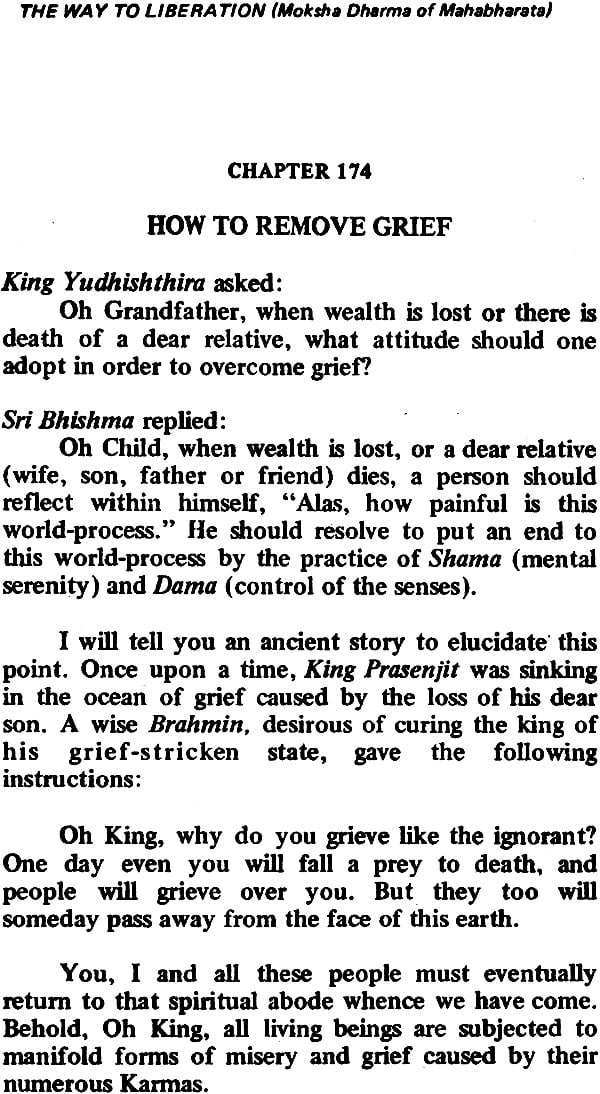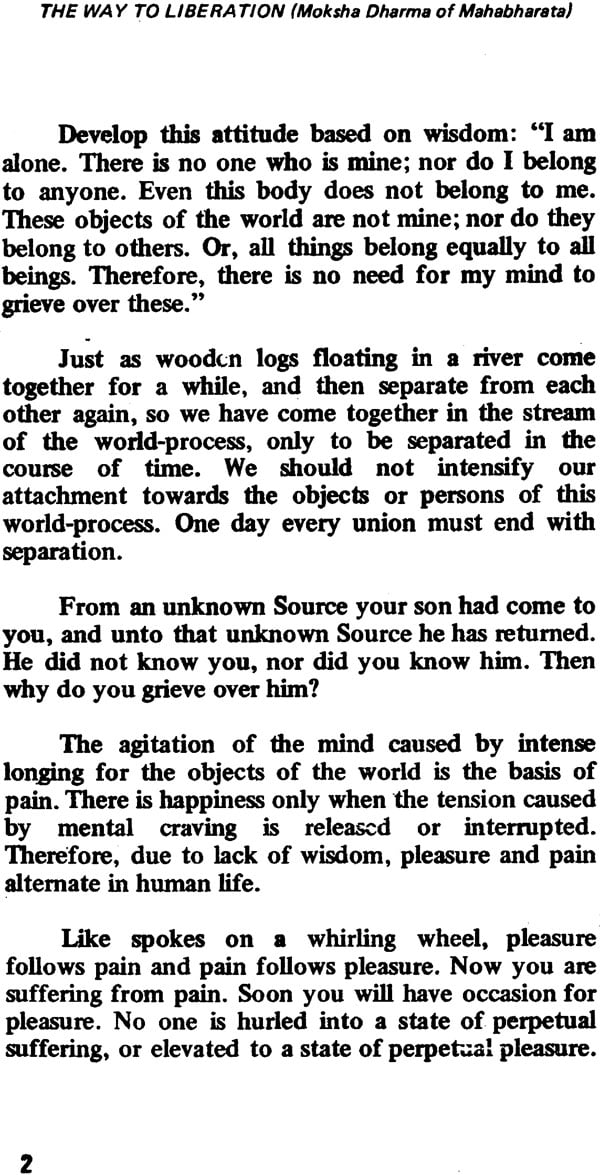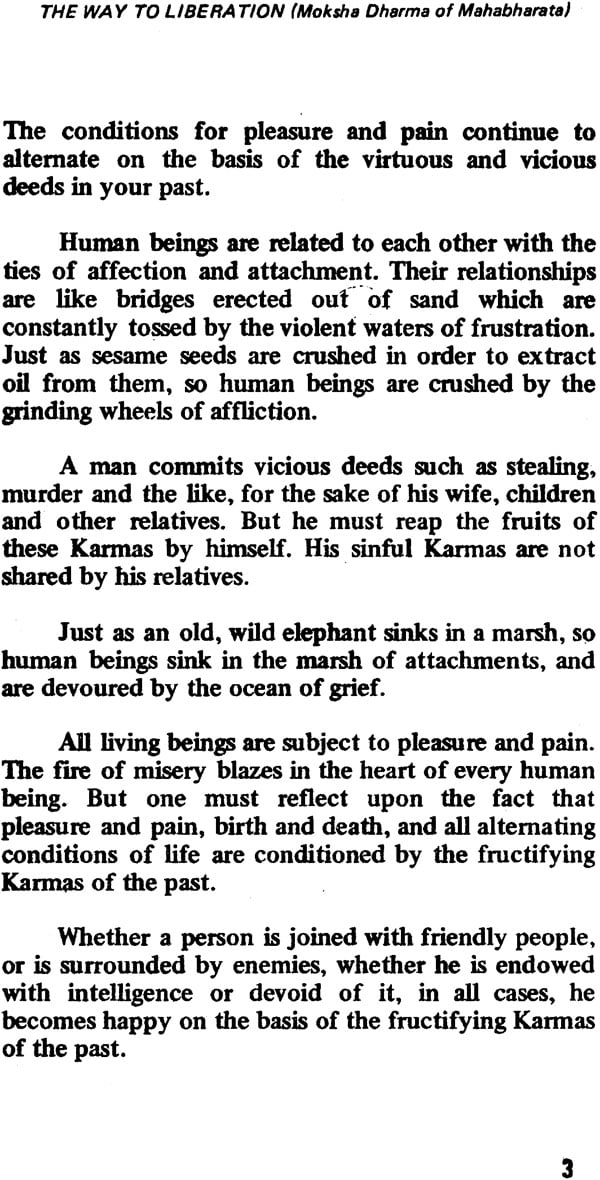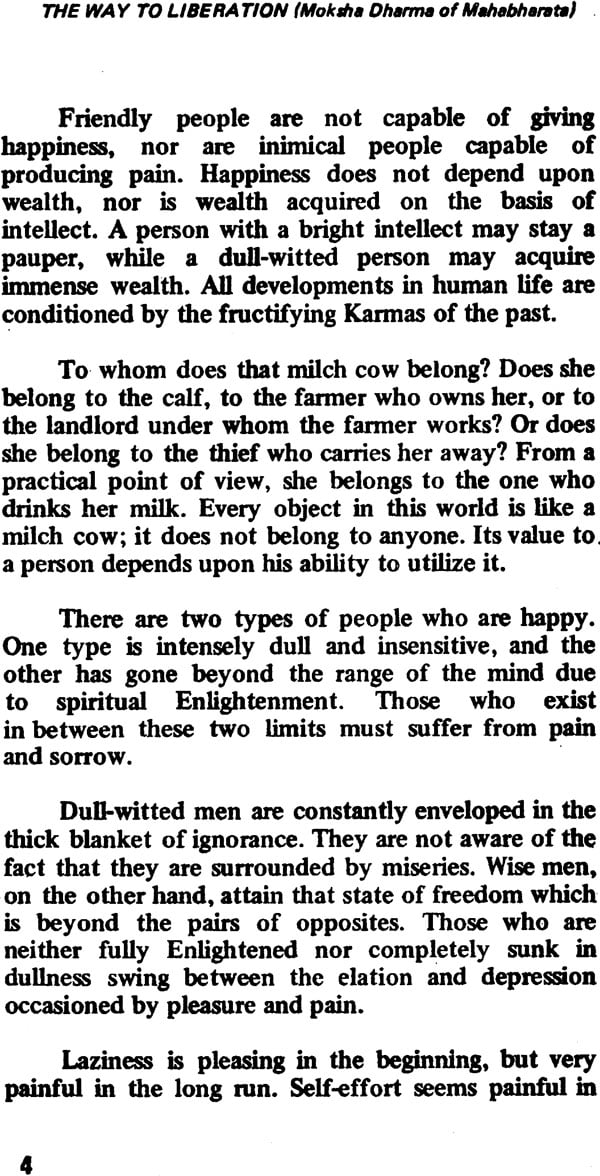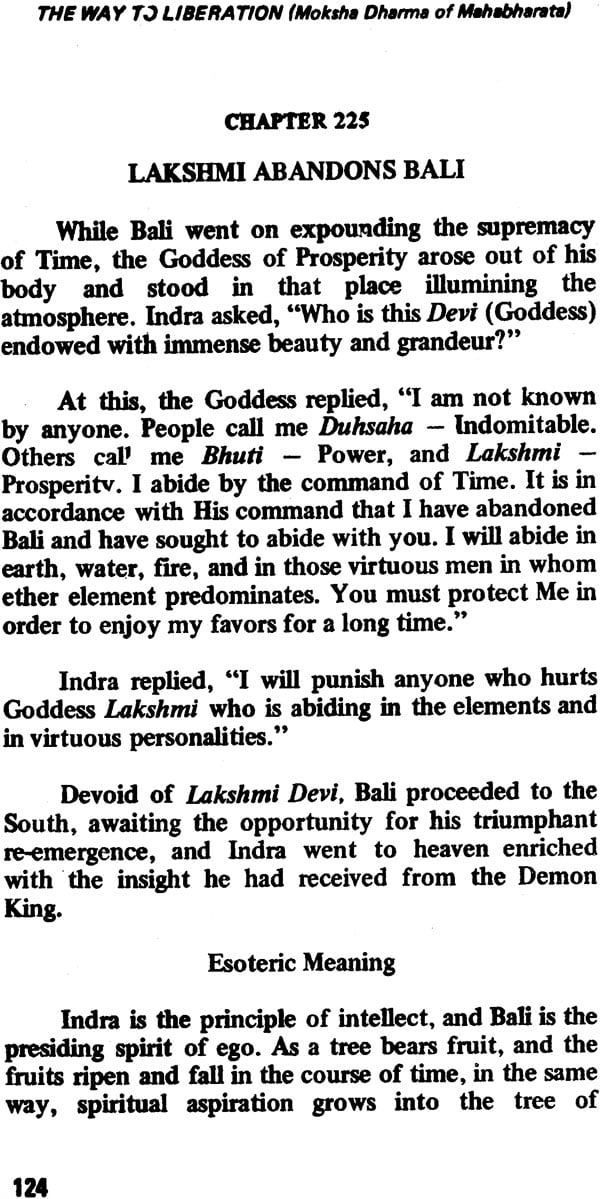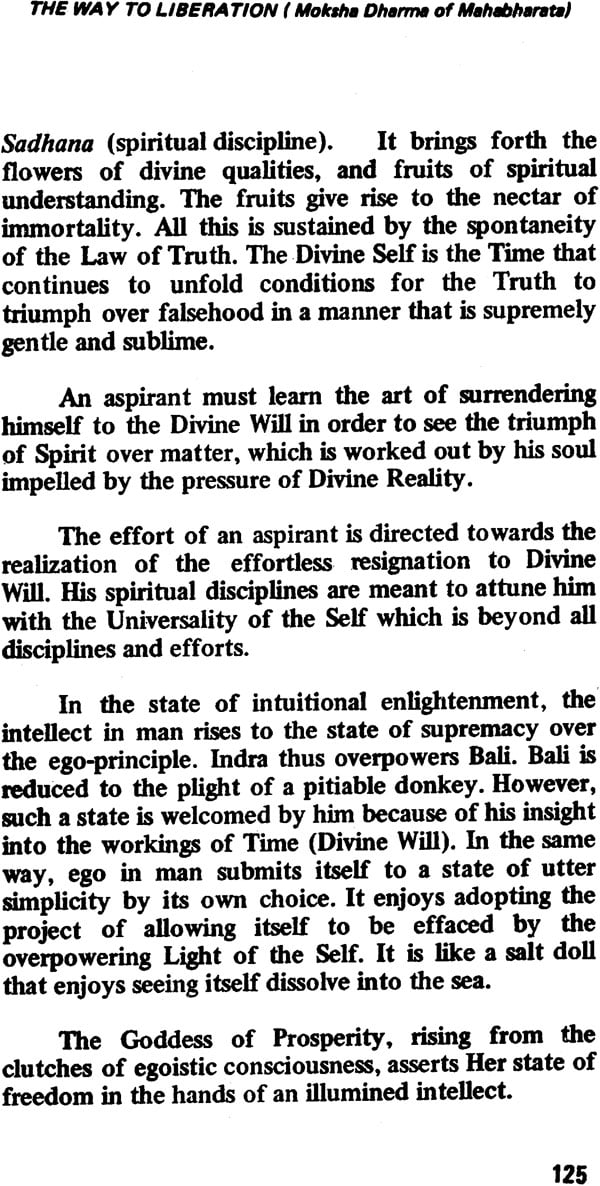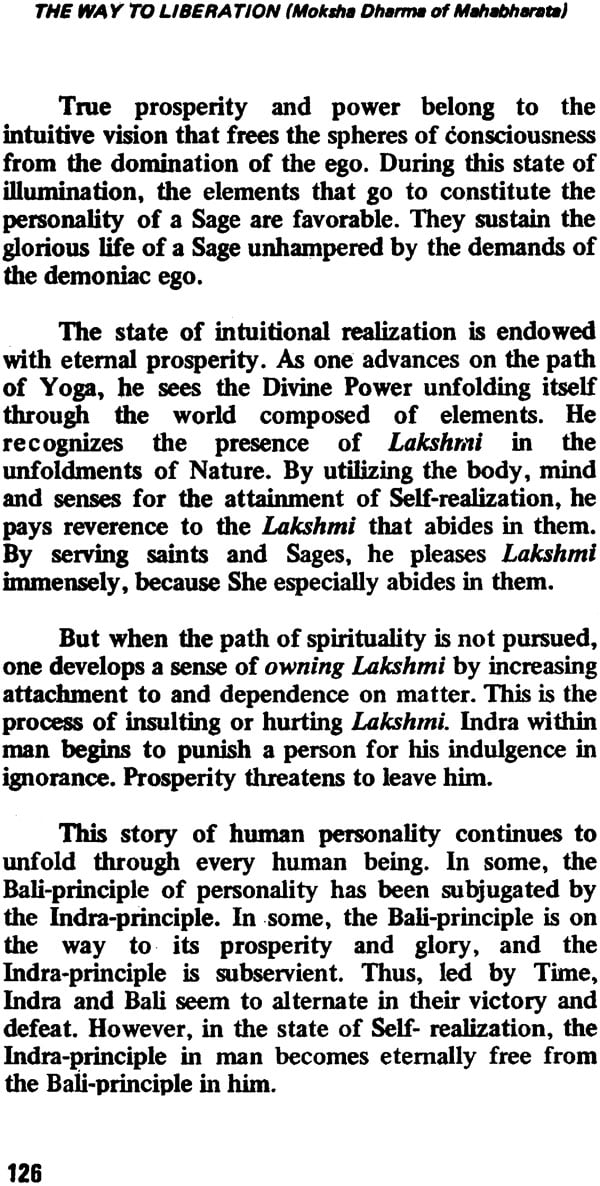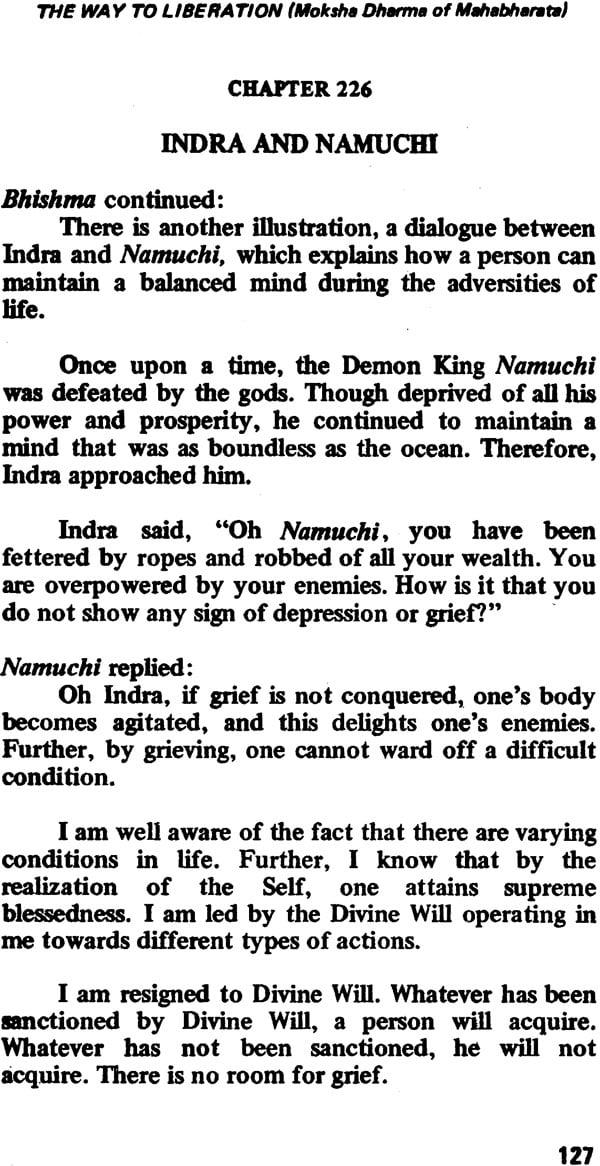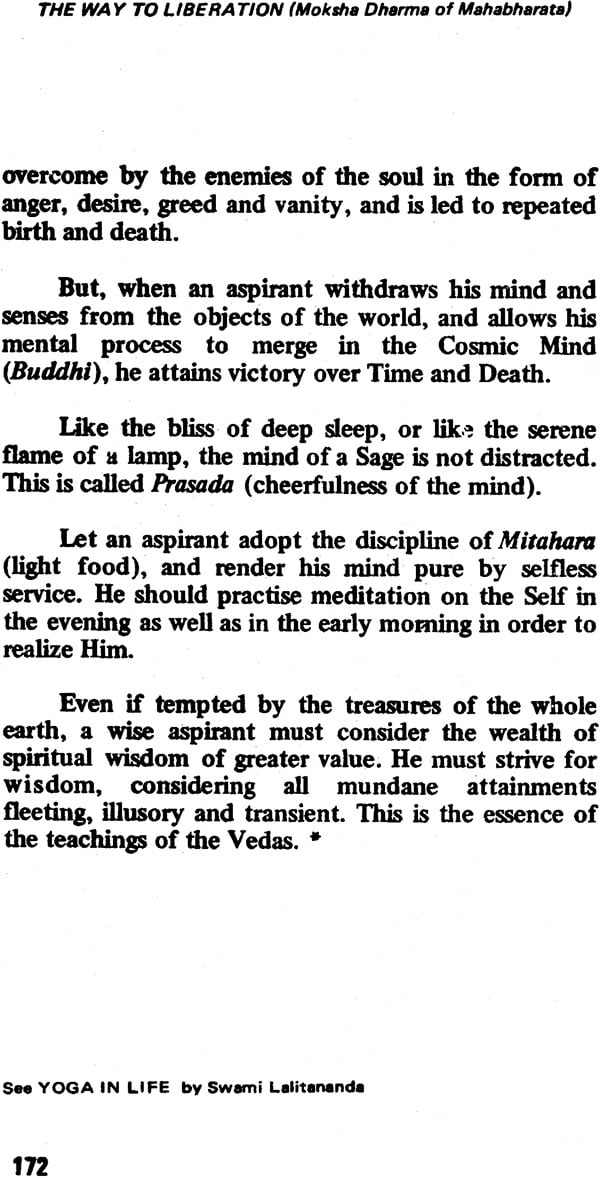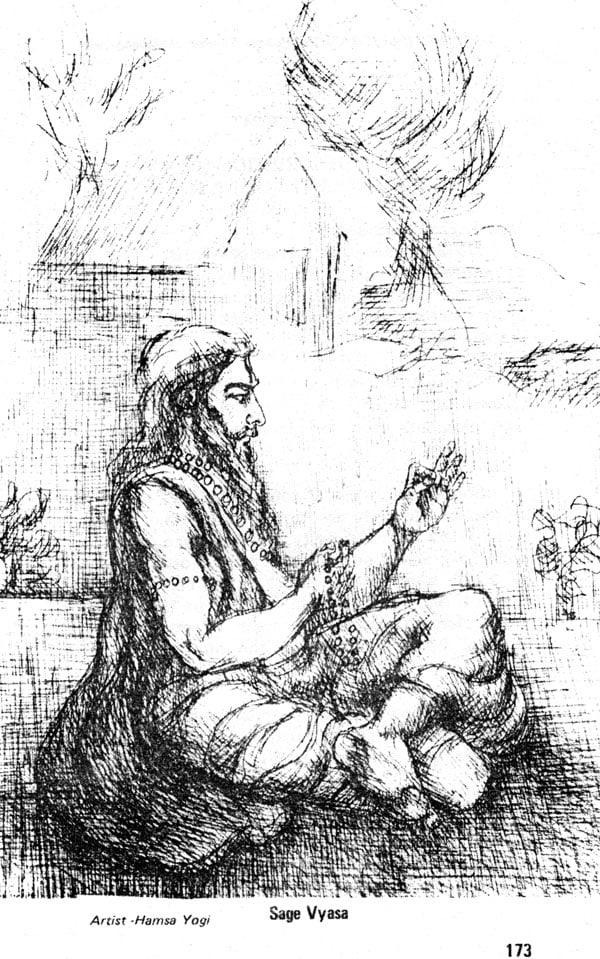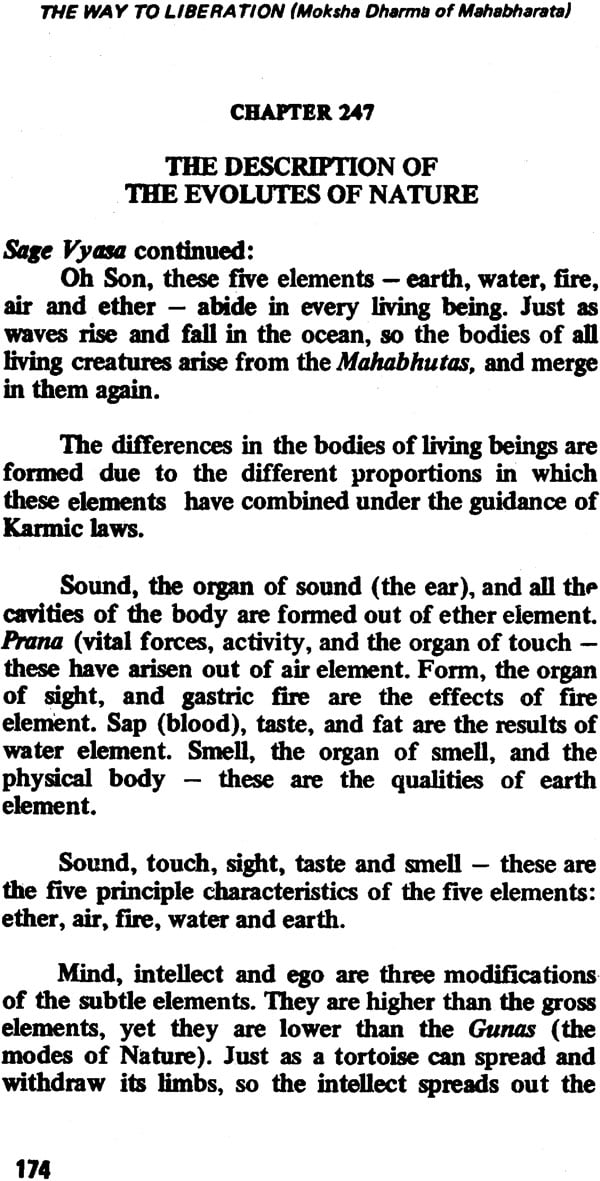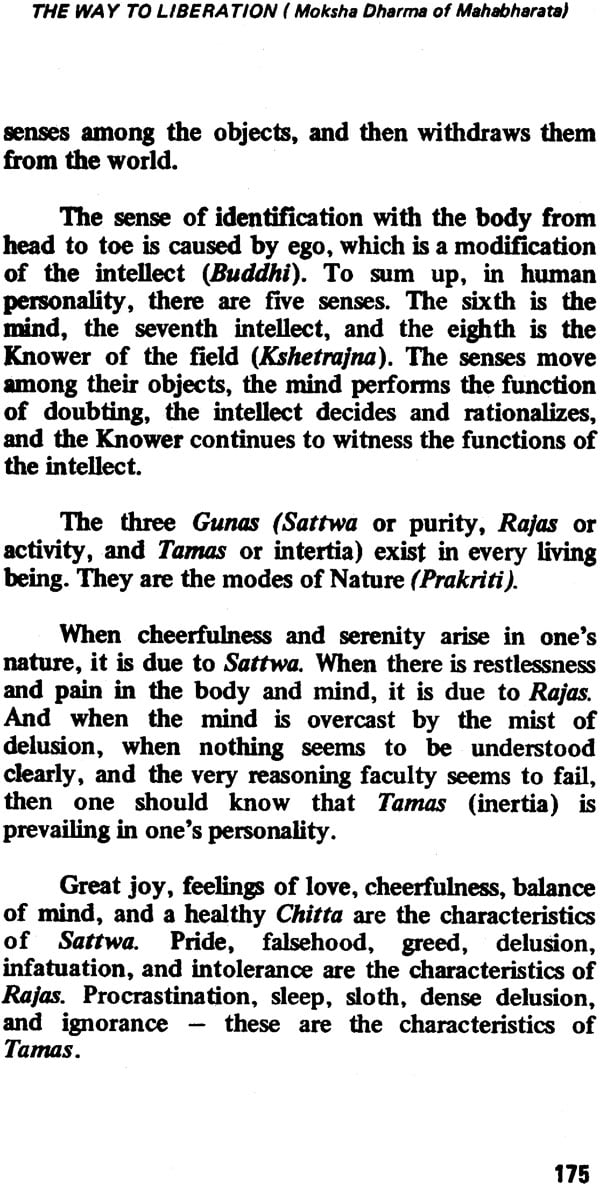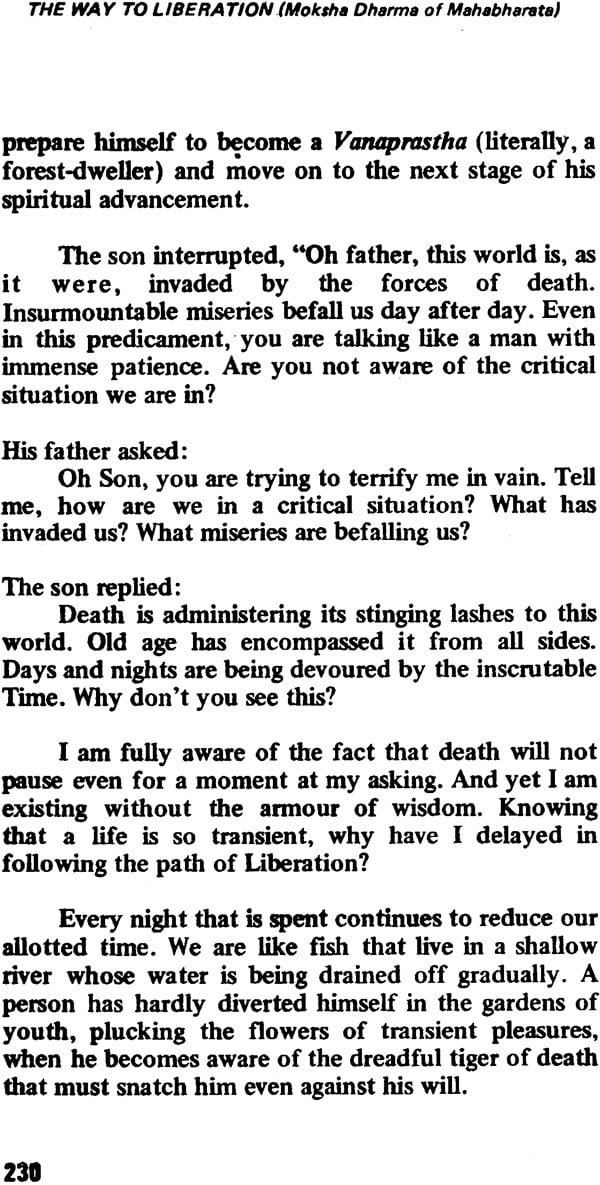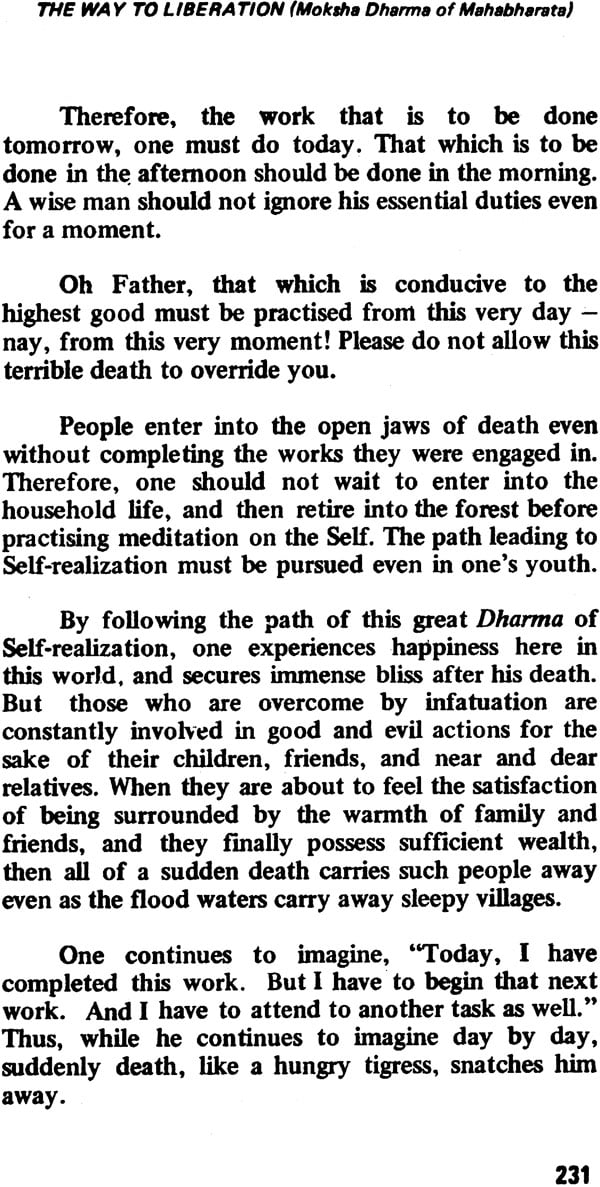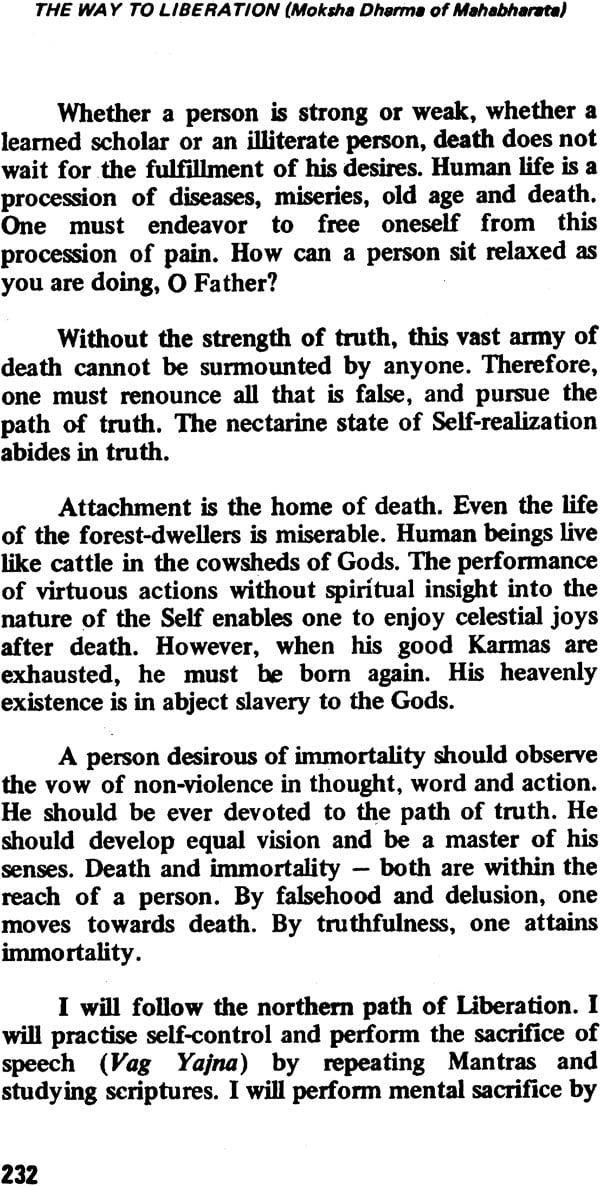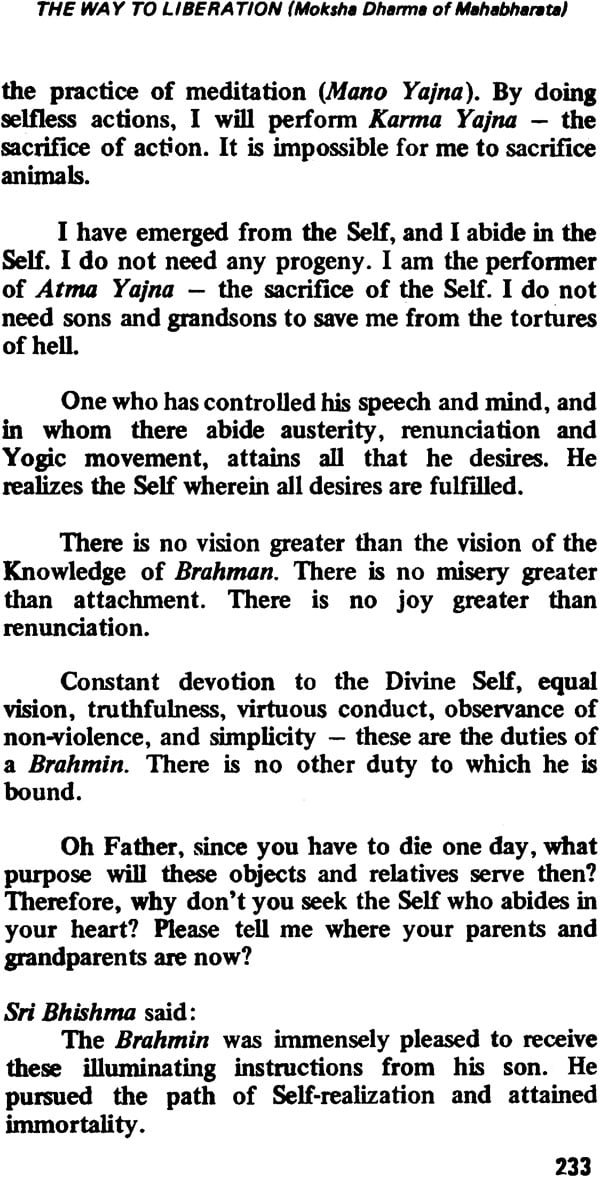
The Way To Liberation (Moksha-Dharma Of Mahabharata)
Book Specification
| Item Code: | IDL175 |
| Author: | Swami Jyotirmayananda |
| Publisher: | INTERNATIONAL YOGA SOCIETY |
| Language: | English |
| Edition: | 2008 |
| ISBN: | 8185883610 |
| Pages: | 270 (15 B/W Illustrations) |
| Cover: | Paperback |
| Other Details | 8.4" X 5.4" |
| Weight | 360 gm |
Book Description
Introduction
The Mahabharata is the mother of the world’s most popular scripture - the Gita, which contains the teachings of Lord Krishna. It was composed by Sage Vyasa many centuries before Christ. This grand scripture consisting of eighteen volumes is an extraordinary religious epic.
His Holiness, Sri Swami Jyotir Maya Nanda, the author of over fifty books on Yoga philosophy and related subjects, has written this book steeped in profound knowledge of the Mahabharata for the aspirants of the East as well as the West. The writings of Sri Swami Jyotir Maya Nanda contain a unique blend of simplicity, literary beauty, mystic insight, and a light to guide you on the path to Self-realization.
Swami Jyotir Maya Nanda’s genius lies in writing his profound thoughts and making them alive, almost walking with a dynamic movement. Each one should give this book the fullest and most careful consideration. Consequently, you will feel rushing within a breeze blessed with blazing dispassion, that will dispel fear and doubts which have been restraining you upward movement to the Self-realization.
The Mahabharata is known as the fifth Veda because it deals with all the topics that concern the individual soul on its way to spiritual evolution. It details upon Dharma (ethical value), Artha (material value), Kama (vital value), and Moksha (the infinite spiritual value of life). There is a popular saying, ‘What is not found in the Mahabharata cannot be found in any other scripture. Whatever is there in other scriptures is definitely present in Mahabharata”
Moksha Dharma Parva of the Mahabharata contains the sublime teachings that enable an aspirant to understand the problems of his life in the light of the primary duty of his existence - the attainment of liberation or Self-realization. The teachings were given by Great Bhishma who was a mighty hero among the warriors of ancient India, and even a greater hero in the spiritual field of life. Though lying on the bed of arrows, this majestic personality continued to counsel King Yudhishthira, day after day, on all important subjects that enrich human life and enable the soul to move towards its final attainment - liberation.
The present book contains selected portions of Shanti Parva, the Volume dealing with Peace, retold by Sri Swami Jyotir Maya Nanda in a manner that will enable the reader to gain a deep insight into the beauteous writings of the Mahabharata. The very study of this book is considered highly auspicious. Pious men in India read this section of the Mahabharata to promote harmony and peace in the atmosphere, to remove obstacles and adversities, to acquire health, peace and prosperity, and to move on to the glorious summits of spiritual perfection. Actual chapter numbers are included to help serious students of the Mahabharata.
Stories and parables, illustrations and poetic images, pithy instructions and penetrating insights are blended in this book. Through the study of this book, along with the first volume, one can gain the storehouse of ancient wisdom which is so needed in the troubled times of the present world. May God bless you!
| Publisher’s Note | 3 |
| Dedication | 5 |
| Introduction | viii |
| How to Remove Grief | 1 |
| The Primary Duty of a Person in this Transient World | 8 |
| The Glory of Renunciation | 12 |
| The Song of a Brahmin Called Manki | 14 |
| Prahlad and Avadhuta on the Attitude of Detachment | 18 |
| A Dialogue Between Kashyapa Brahmana and Indra | 23 |
| Fruits of Karma | 26 |
| The Glory of Right Conduct and the Defect of Sinfulness | 28 |
| The Knowledge of Self | 30 |
| Yoga of Meditation | 35 |
| Glory of Japa (Repetition of Mantra) | 37 |
| He Who Falters in Japa Falls Into Hell | 40 |
| Even Heavenly Words Are Hell for a Japaka | 41 |
| Story of Japaka Brahmana and King Ikshwaku | 43 |
| Prajapati Manu and Sage Brihaspati | 51 |
| The Nature of Self and the Manner of Realizing It | 55 |
| The Eternal Nature of the Self | 57 |
| The Method of Attaining Self-realization | 59 |
| The Method of Attaining, Brahman, the Absolute | 61 |
| The Nature of the Supreme Self | 64 |
| Bhagavan Krishna: The Source of Creation | 67 |
| Story of Bhagavan Varaha | 71 |
| The Wheel of the World-process | 82 |
| Study of the Three Gunas | 85 |
| Detachment From Sensual Enjoyments | 87 |
| Practice of Brahmacharya And Vairagya for Liberation | 89 |
| Instructions for Attaining Brahman | 92 |
| Sage Panchashikha Expounds the Nature of the Self | 99 |
| Regarding the Nature of the Self | 103 |
| Story of Shwetaketu and Suvarchala | 105 |
| The Nature of Austerity | 111 |
| Spiritual Instructions by Sanat Kumara | 112 |
| Indra and Bali | 119 |
| Lakshmi Abandons Bali | 124 |
| Indra and Namuchi | 127 |
| Indra and Bali | 130 |
| Qualities That Please Goddess Lakshmi | 132 |
| The Nature of Time | 136 |
| Yuga Dharma | 140 |
| Description of Brahma Pralaya and Maha Pralaya | 144 |
| The Glory of Serving the Brahmanas | 146 |
| The Duties of a Brahmana and the Manner of Crossing the Stream of Time | 148 |
| Yoga of Meditation | 151 |
| The Predominance of Intellect | 156 |
| The Glory of Wisdom and the Means of Attaining It | 159 |
| God Is Realized Through Yoga | 161 |
| The Difference Between Action and Knowledge | 164 |
| The Conduct of a Sanyasi | 167 |
| The Method of Attaining god-realization | 171 |
| Description of the Evolutes of Nature | 174 |
| The Greatness of Intellect | 176 |
| Characteristics of a Wise Man | 178 |
| The Method of Crossing the River of the World-process | 180 |
| Characteristics of a Knower of Brahman | 182 |
| Functions of the Five Great Elements | 185 |
| Self Differentiated from the Three bodies | 186 |
| The Tree of Desire & the Manner of Eradicating It | 187 |
| More About the Five Elements, Mind & Intellect | 189 |
| Story of the Origin of Death | 191 |
| Death Practises Austerity, | |
| And Is Ordained to Destroy Living Beings | 193 |
| An Insight Into Dharma and Adharma | 199 |
| The Story of the Ascetic Jajali | 201 |
| Tuladhara Explains the Nature of Dharma | 203 |
| Tuladhara Gives Spiritual Instructions | 205 |
| Jajali Receives Instructions from Birds | 207 |
| The Story of Gautama and Chirkari | 210 |
| Story of the Brahmana & Kundadhara Megha | 217 |
| Questions on Dharma, Adharma, Vairagya & Moksha | 221 |
| The Way to Self-realization | 225 |
| A Son Instructs his Father Regarding the Transitoriness of the World-process | 229 |
| Transitoriness of the World-process | 229 |
| The Method of Attaining Brahman | 234 |
| Vritrasura Receives Instructions from the Sanat Kumaras | 236 |
